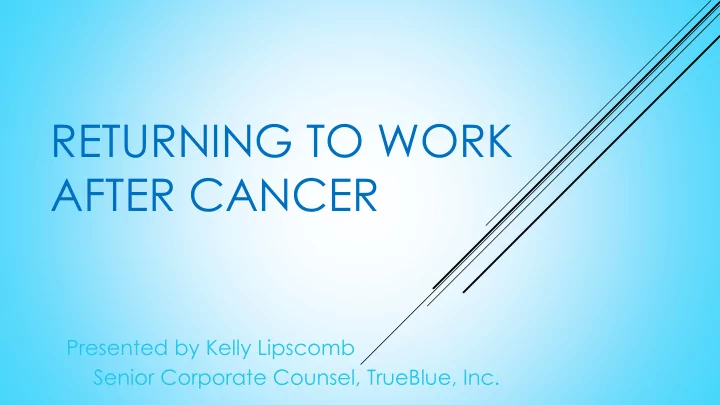

RETURNING TO WORK AFTER CANCER Presented by Kelly Lipscomb Senior Corporate Counsel, TrueBlue, Inc.
You Are Not Alone
Diagnosis: A Very Difficult Time
Concerns About Ability to Continue to Perform Job • After addressing key health-related questions and choosing plan that is best for your health, consider how your condition and treatment may affect your work. • Consider providing your doctor your job description. • Might need to ask doctor for documentation to request accommodation from your employer. Note: First you need to decide if you are going to tell your employer about your diagnosis.
Whether To Tell Your Employer That You Have (Or A Family Member Has) Cancer • Factors to Consider: o The type of workplace: friendly and close-knit or formal and business-focused? o How has the employer handled other employees’ diagnoses? o Nature of prognosis – will you need to take leave for treatment? • Keep a journal of all conversations/copies of emails with employer about your condition and requests for accommodation. Note: Even if you decide to tell your employer, you get to decide whether and how to tell co-workers.
Pros And Cons Of Telling Your Employer About Diagnosis Pros Cons Facilitates discussion about Fear of retaliation. accommodations. Leave (paid or unpaid) or flex-time. Fear of isolation. Employer can’t use disability -related If employer doesn’t know about performance issues as basis for poor condition and work suffers due to review. condition, may be used as basis for poor review. Employer can offer information about benefits. Support from professional community.
Applicable Leave Laws Law Employers Subject to Leave Available Law ADA 15+ employees No Limit – leave as a “reasonable accommodation” WLAD 8+ employees No Limit – leave as a “reasonable accommodation” FMLA and WFLA 50+ employees 12 weeks WA Sick and Safe 1+ employee 1 hour for every 40 Leave (exemptions apply) hours worked
The Interactive Process • Legal term for the discussion between employer and employee that must take place when employee identifies potential need for accommodation. • Good faith discussion between employer and employee about possible accommodations that will allow employee to perform the essential functions of her job. Note: No special language required. Plain language request triggers the employer’s responsibility to engage.
Reasonable Accommodation – What’s Covered? • An employer must provide a reasonable accommodation that is needed because of: o The limitations caused by cancer itself o The side effects of medication or treatment for the cancer
Reasonable Accommodation – What’s Available? • Examples of accommodations: o Time off (continuing or intermittent) for treatment o Working from home o Physical restrictions – lifting restrictions or periodic beaks to rest or take medication o Reassignment to vacant position when no longer able to perform current job o Accommodations for side effects of treatment (chemo brain; depression related to diagnosis or prognosis) Note: Employer can request documentation to support need for accommodation.
The Interactive Process – Employee’s Responsibility • Employee must actively participate in interactive process. • Failure to provide employer with requested documentation may result in accommodation not being provided or in some cases, termination. • Interactive process is an ongoing obligation – failure of an attempted accommodation does not excuse employer from further participation in process. Note: Employer doesn’t have to provide the accommodation requested by employee if another will be sufficient to allow her to perform essential functions.
Performance Problems After Diagnosis – What Can Employers Ask? • Employer may ask disability-related questions or require an employee to have medical exam when: o Employer knows about employee’s medical condition, o Has observed performance problems, and o Reasonably believes that the problems are related to medical condition. • Employer may also ask for medical information when it has observed symptoms or received reliable information from someone else, indicating that the employee may have a medical condition that is causing performance problems.
Employers Must Keep Medical Information Confidential • Can employer tell co- workers about employee’s condition in response to questions about “special treatment?” No. • If employee’s appearance changes and employer receives questions from co-workers about employee, can employer explain that she has cancer? No.
Applying for a Job After Cancer • Can employer ask you whether you’ve had cancer? No. • Do you have to disclose that you’ve had cancer before accepting a job? No. • Can employer ask follow- up questions if you voluntarily reveal you’ve had cancer? Not unless employer reasonably believes you will require an accommodation to perform the job. • Can employer require you to undergo medical exam before taking job? Only when all applicants are required to undergo exam. • Can employer exclude you from a job for safety reasons? Only when you a “significant risk of substantial harm” to yourself or others, and that risk cannot be eliminated or reduced through reasonable accommodation.
What About Pot? • State and federal courts have held that employer can terminate or refuse to hire employee who tests positive for THC (also, federal law requires a drug-free workplace for federal contractors) • This includes medical marijuana because it is a Schedule I drug Note: Marinol is a Schedule III synthetic THC drug (and therefore shows up on a drug test like marijuana), but can be prescribed by physician, and therefore not subject to zero-tolerance policies.
When Things Go Poorly • Harassment, discrimination, and retaliation based on an individual having cancer, having had cancer, or being perceived to have or have had cancer is illegal. • Employees should report this conduct to their supervisor or Human Resources. • Employees and applicants may file a charge with the Washington State Human Rights Commission or the Equal Employment Opportunity Commission, who will investigate the claim and may work to resolve it.
Questions & Answers about Cancer in the Workplace and the ADA https://www.eeoc.gov/laws/types/cancer.cfm Washington Human Rights Commission - https://www.hum.wa.gov/ Seattle Human Rights Commission - https://www.seattle.gov/humanrights Labor and Industry – https://www.seattle.gov/humanrights klipscomb@trueblue.com
Recommend
More recommend